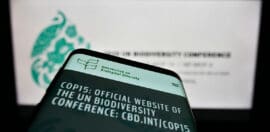This month in ESG: Shell, plants over meat and sustainable fuel for helicopters

28 February 2023 at 9:44 pm
Shell is facing multiple legal actions, the numbers show plant-based investment is a winner, Victoria bans single use plastic and more.
The month of February saw multiple legal actions facing Shell, research showing plant-based investment is better than any other climate investment, Vanuatu leading a coalition of countries seeking climate justice and the world’s first 100 per cent single engine helicopter flight with sustainable aviation fuel.
Again, if I happen to miss some key markers in a particular month. Just drop me some comments, and I will pick them up next month!
*‘ESG Markers’ – like biomarkers that tell us how healthy our body may be, ESG Markers showing us the big movements in the field of ESG in Oceania and globally.
So, here are my Top 10 for February 2023, again in no particular order.
Shell faces climate litigation on multiple fronts
The directors of Shell are being personally sued over their climate strategy, which is allegedly inadequate to meet climate targets. Environmental lawyers ClientEarth has filed the lawsuit against the directors at the high court in England. It is reportedly the first case in the world seeking to hold corporate directors liable for failing to properly prepare their company for the net zero transition. ClientEarth is supported by a group of large pension funds and other institutional investors including Nest, London CIV, Swedish national pension fund AP3, French asset manager Sanso IS and Danske Bank Asset Management. In May 2021, the Dutch court ordered Shell to cut carbon emissions from its oil and gas products by 45 per cent by 2030. The case was brought by Friends of the Earth and more than 17,000 co-plaintiffs. Earlier this month, a non-profit group lodged a complaint against Shell with the US Securities and Exchange Commission, alleging that the company had overstated how much it is spending on renewable energy. The company was also sued this month in London’s high court by 14,000 people from two Nigerian communities for its responsibility in devastating pollution of their water sources.
Plant-based meat by far the best climate investment
A report from the Boston Consulting Group (BCG) found that each dollar invested in improving and scaling up the production of meat and dairy alternatives resulted in:
- Three times more greenhouse gas reductions than investment in green cement technology,
- Seven times more reductions than green buildings
- Eleven times more reductions than zero-emission cars.
Alternative proteins currently only make up 2 per cent of meat, egg and dairy products sold, but will rise to 11 per cent in 2035 on current growth trends, the report said, resulting in a similar amount to global aviation emissions. Europe and North America will reach “peak meat” by 2025, at which point consumption of conventional meat starts to fall, according to another BCG report in 2021. Separately, AT Kearney, found in 2019 that that most of the meat products people eat in 2040 will not come from slaughtered animals. Meat and dairy production uses 83 per cent of farmland and creates 60 per cent of agriculture’s greenhouse gas emissions, but provides only 18 per cent of calories and 37 per cent of protein. The report also included a survey of more than 3,700 people in the UK, US, China, France, Germany, Spain, and the United Arab Emirates, which found 30 per cent of consumers would switch to alternative protein products if they had a positive climate impact. About 90 per cent of people said they liked at least some of the alternative-protein products they had tried. But the survey found that consumers expected the products to cost no more than those they were replacing.
On other plant-based news, students at the University of Cambridge have voted to support a transition to a solely vegan menu across its catering services, voting to hold talks about removing all animal products from its cafes and canteens with the university’s catering services. However, the move does not guarantee that Cambridge’s catering services will go fully vegan, as that decision will lie with the university. It also does not apply to the university’s 31 colleges.
Corporate inaction on deforestation threatening their net zero ambitions
A research report by Global Canopy found 98 per cent of net zero targets were at risk due to their deforestation links. The researchers have named large companies including Ikea, Amazon, and Starbucks in their report. Forest-related policies and performance of 350 large companies has found glaring deforestation blind spots in many policies that threaten to undermine their ability to achieve net zero.
The study states inaction on deforestation is threatening to undermine corporate net zero targets. Of the 350 companies assessed, 41 per cent have a 2050 net zero target in place, including British firms such as Sainsbury’s and Unilever. But 98 per cent of these companies (142) are on track to miss their target due to insufficient action on eliminating deforestation from their supply chains. The majority of investors surveyed were found to have no deforestation policies in place for any commodities, including the world’s biggest asset managers, BlackRock, Vanguard and State Street.
IFRS Sustainability and Climate Reporting Standards to take effect in 2024
The International Financial Reporting Standards Foundations’ (IFRS) new global sustainability and climate disclosure standards will be effective as of January 2024, according to an announcement this month by the IFRS’s International Sustainability Standards Board (ISSB). The new reporting standards are expected to be released by the end of Q2 2023, with companies beginning to issue disclosures against the standards in 2025.
In addition to the 2024 effective date announcement, the ISSB has also made its final decisions on all of the technical content of the standards, indicating that the substance of the standards has now been fully agreed. The ISSB also voted to include a reference to the GRI standards and the European Sustainability Reporting Standards (ESRS) as sources of guidance for companies to be allowed to consider in the application of the IFRS’ general sustainability reporting standard (“S1”), in the absence of a specific ISSB standard.
Victoria bans single use plastics
Single-use plastics are now banned from sale or supply in Victoria. These include drinking straws, cutlery, plates, drink stirrers, cotton bud sticks, expanded polystyrene food service items and expanded polystyrene drink containers. The ban applies to conventional, degradable and compostable plastics. People who need single-use plastic drinking straws due to disability or medical needs can still purchase and use these items. The Victorian Government has undertaken a comprehensive, state-wide program to assist businesses and organisations to understand and prepare for the ban.
New Zealand faces more extreme and record-breaking weather
Record-breaking rainfall and flooding preceded the tropical cyclone Gabrielle resulting in major disasters on the north island with a high likely link to climate change. January broke a century-old record for Auckland’s wettest month, half of that falling in a single day. The cyclone has already claimed twelve lives, and cut numerous roads and bridges around the north island, leaving communities isolated. Even New Zealand’s largest international airport was submerged in the January floods. Farmers and vineyards have been hard-hit. Ironically, New Zealand’s single biggest source of greenhouse gas emissions is agriculture, with nearly 40 per cent of emissions being methane from livestock.
Scientists fear that New Zealand is also now facing the prospect of bushfire seasons.
Greenwashing may carry significant fines in the UK and EU
Under the digital markets, competition and consumer bill to be unveiled shortly in the UK, big companies face the prospect of civil penalties of up to 10 per cent of global turnover for breaches of consumer law. Individuals who breach these laws may face fines of up to £300,000. The prime minister has prioritised passing this new bill. Green claims found to be unsubstantiated and misleading would fall into this law. The European Union is also set to introduce a new law shortly proposing fines for companies making unsubstantiated environmental claims. Furthermore, France introduced laws in January requiring firms claiming a product is carbon-neutral to report on all the greenhouse emissions of that product for its entire lifecycle.
Reserve Bank of India announces regulatory guidelines on climate risk and sustainable finance
Reserve Bank of India has recently announced regulatory initiatives on climate risk and sustainable finance. This included a decision to prepare a strategy based on global best practices on mitigating the adverse impacts of climate change and to issue several guidelines for Regulated Entities (REs). These guidelines include:
- Broad framework for acceptance of Green Deposits
- Disclosure framework on Climate-related Financial Risks
- Guidance on Climate Scenario Analysis and Stress Testing
Vanuatu seeks climate justice
The Republic of Vanuatu is leading a coalition of states seeking an Advisory Opinion on Climate Change from the International Court of Justice (ICJ).
International Law already contains obligations to prevent harm to the environment and protect human rights. The UN’s International Court of Justice is the only principal mechanism of the UN System that has not yet been given an opportunity to help address the climate crisis. A growing coalition of more than 90 nations (including Vanuatu, Antigua & Barbuda, Costa Rica, Sierra Leone, Angola, Germany, Mozambique, Liechtenstein, Samoa, Federated States of Micronesia, Bangladesh, Morocco, Singapore, Uganda, New Zealand, Vietnam, Romania and Portugal) is calling for a non-binding Advisory Opinion (ICJ climate Resolution) from the International Court of Justice to gain clarity how existing International Laws can be applied to strengthen action on climate change, protect people and the environment and save the Paris Agreement.
The ICJ climate Resolution will be tabled during the current 77th session of the UN General Assembly requesting the International Court of Justice to provide an advisory opinion on the obligations of States under international law to protect the rights of present and future generations against the adverse effects of climate change. A petition to support this call can be signed at Vanuatu ICJ Initiative – Support
Bell 505 becomes world’s first helicopter to fly Using 100 per cent sustainable aviation fuel
This month, the Bell 505 completed its first flight fuelled solely by 100 per cent Sustainable Aviation Fuel, marking it the first-ever single engine helicopter to fly with 100 per cent SAF. This could potentially result in carbon lifecycle emissions of flights being reduced by up to 80 per cent. Bell collaborated with Safran Helicopter Engines, Neste, GKN Aerospace and Virent Inc. on the trial, which required no engine modifications.
This flight supports Bell Textron Inc’s 2025 Sustainable Footprint goal for 20 per cent reduction in greenhouse gas emissions across the enterprise, among other sustainability initiatives.








Hi Terence, great article. I’d be keen to know who initiated and/or funded the report from the Boston Consulting Group (BCG).